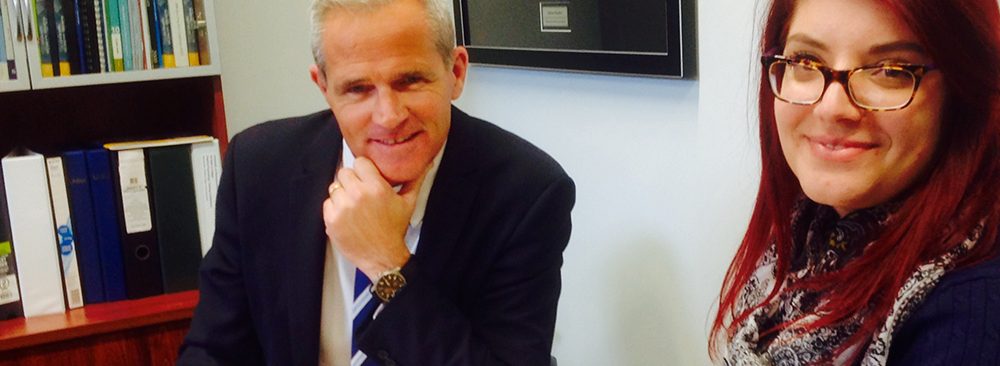Gaining Digital Citizenship
There seems to be nothing more demotivating than to open a talk with teenage boys with, “We need to make you aware of your safety online.” And yet, every week the news features something where unwise choices have led to serious crimes in the cyber world. To stop and think before we post a comment online or ‘press send’ is more important now than ever before.
In our Digital Citizenship Program, outlined below, we are aiming to impart necessary information to our boys and ensure they act in full knowledge of the law and their responsibilities within it. Making sure they are aware that all electronic communication cannot be deleted permanently, and understand that they are building a profile of themselves every time they are online, is essential.
Some common mistakes include not knowing that when they comment on something negatively on social media, it is the equivalent of publishing something on the public record which could be deemed defamatory and actioned in court. Obviously, making unkind comments about others is unwise for many reasons and young people often use the excuse of humour to explain away these actions, but we must remember that if we write it, we can he held responsible for it.
The program of Digital Citizenship will occur in Mentor groups which allows small group discussions on relevant youth topics such as ‘sexting’ and ‘being aware of our digital footprint’. Our aim is to inform our boys in an age appropriate way of their rights and responsibilities whilst communicating with one another digitally. They will also be encouraged to report any unkind comments or postings and to speak up if they witness it in their observations of others’ communication.
In general, digital communication is good. It is a useful and informative tool as well as being an excellent way for young people to stay connected. Our aim is that it remains just this and does not defame others or ourselves with unwise and uninformed choices. We look forward to delivering this program to our boys in the coming weeks.
Digital Citizenship Program
Due to the nature of which youths are now accessing digital technologies and participating in online environments for both personal and academic reasons, it is imperative that students develop a digital compass, or key set of understandings, to navigate its complexities. It is only fitting then that schools take ownership of implementing a set of guiding principles into the curriculum that provide teaching and learning resources on the topic of digital citizenship. The integration of a Digital Citizenship Program within Mentor groups at Newington, allows teaching staff to facilitate a student’s growth in gaining transferable digital citizenship skills in order for them to thrive online. In doing so, students are empowered to become enlightened and ethical navigators of their digital lives, and are well prepared for the rigours of adulthood in the 21st Century.
The 2015 program offers opportunities for discussions across a wide variety of areas. An example of a lesson plans for the Mentor groups can be found on the school’s ICT Blog, by our Teaching and Learning Librarian, Mrs Lily Young. Overall, sessions for each year group consisted of the following outcomes:
Year 8: RIGHTS AND RESPONSIBILITIES
- Identify what personal information should be kept private and discuss the suitability for public and private profiles
- Identify what good digital citizenship practices are
- Explain how one’s digital footprint can impact him/her in the future
- Discuss strategies when using online platforms to ensure students are conscious of what personal information is publicly available, which may provide an opportunity to combat online bullying.
Year 9: DIGITAL HEALTH AND WELL-BEING
- Identify what digital tools are, and the role it plays in their lives
- Learn basic statistics about the current digital landscape
- Reflect on the positive and negative impacts of digital tools, and how they affect themselves
- Discuss addiction in relation to technology and strategies such as ‘screen time’.
Year 10: SEXTING
- Explore the role of digital technologies in romantic relationships
- Analyse risky forms of self-disclosure and their possible consequences
- Identify strategies for avoiding sexting while enhancing romantic relationships
In the future, Newington College’s aim, in collaboration with Mrs Lily Young, is to continue to host these themed sessions in Mentor groups and create a series of programs that cover the ‘essentials’ of good digital citizenship practice, to embed across all areas of school life. The Library aims to continue to develop and implement an effective digital citizenship strategy across the curriculum, which encompasses the grounding of the following ‘Six Tenets of Citizenship‘ (Churches, 2012):
- Respect yourself
- Protect yourself
- Respect others
- Protect others
- Respect intellectual property
- Protect intellectual property.
Our students’ real world is the online world; as educators, we are encouraged to facilitate this, to be involved in the development and implementation of various strategies, programs, events and activities to support students and their technology use across the curriculum, and to develop in students and staff a love of learning and habits of lifelong learning. At Newington, staff demonstrate teaching practices that reflect current innovative pedagogy in teaching and learning, advocating higher order questioning, critical and creative thinking, and problem solving that assist in the development of our boys to become self-directed, inquisitive and reflective learners. In doing so, all staff, specifically Mentors, create and nurture an information-rich learning environment which supports the needs of the Newington community.
Mr Bob Meakin
Deputy Head of Stanmore (Students)






